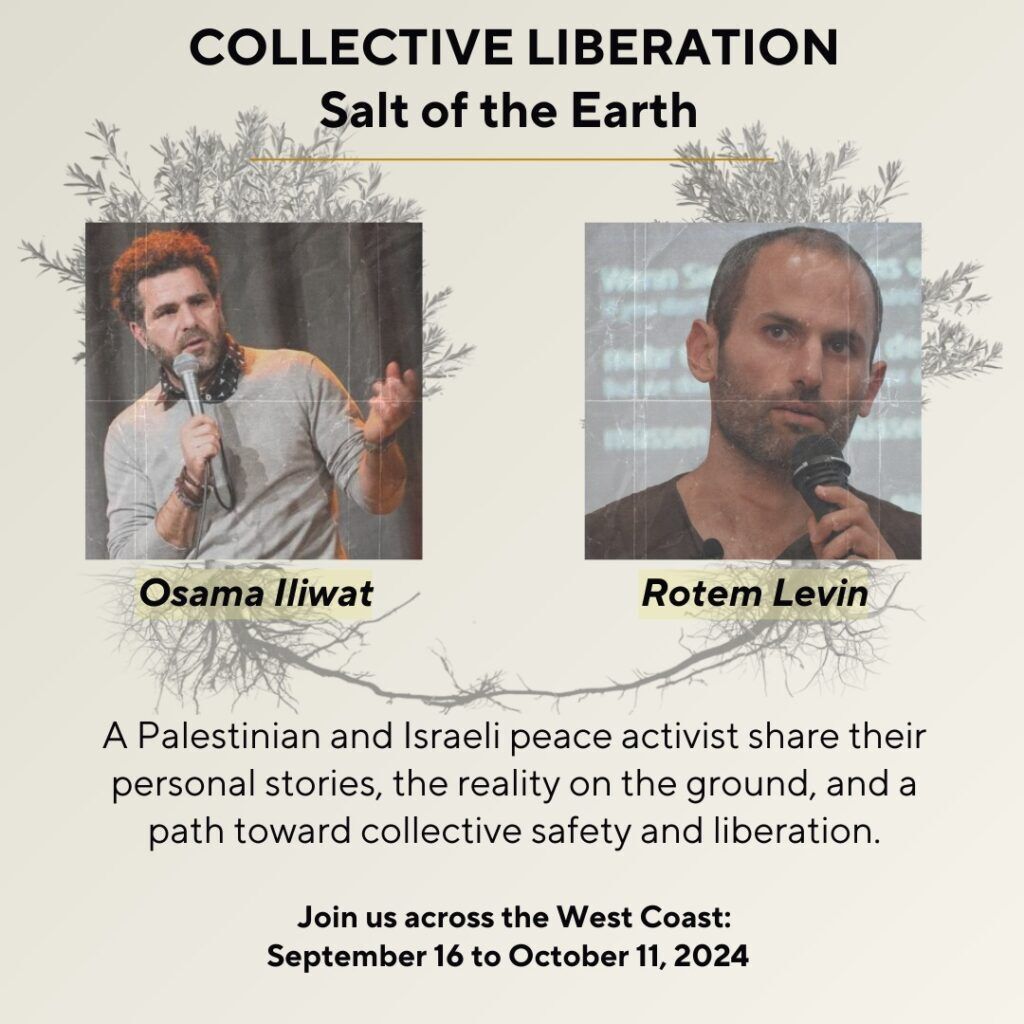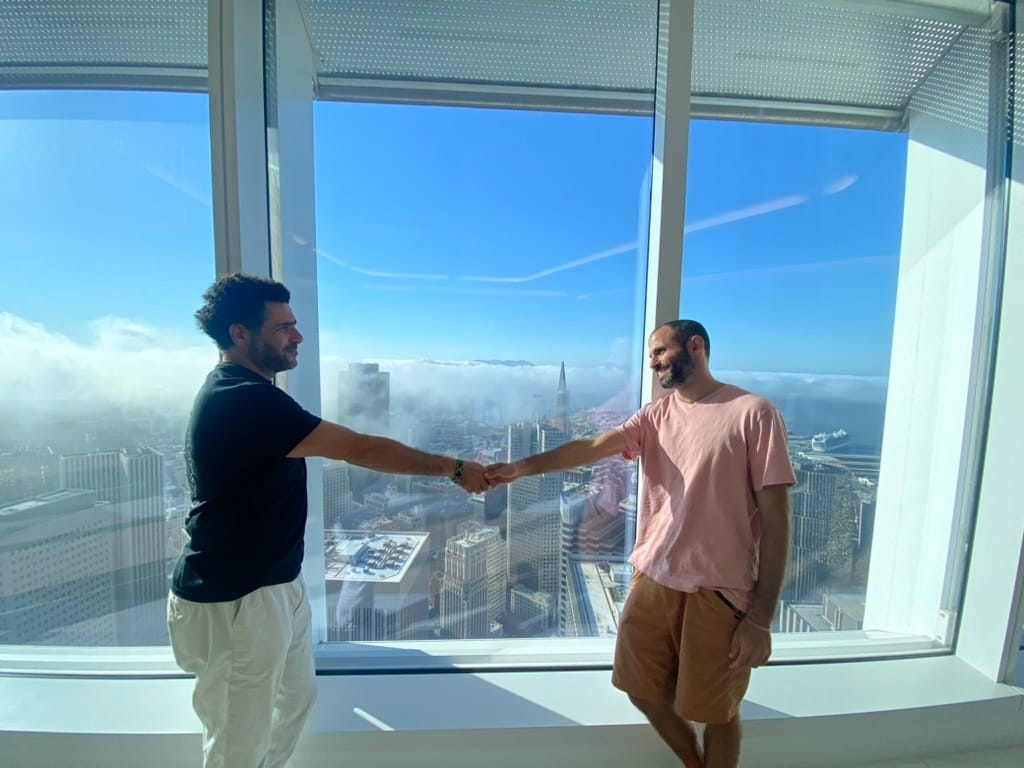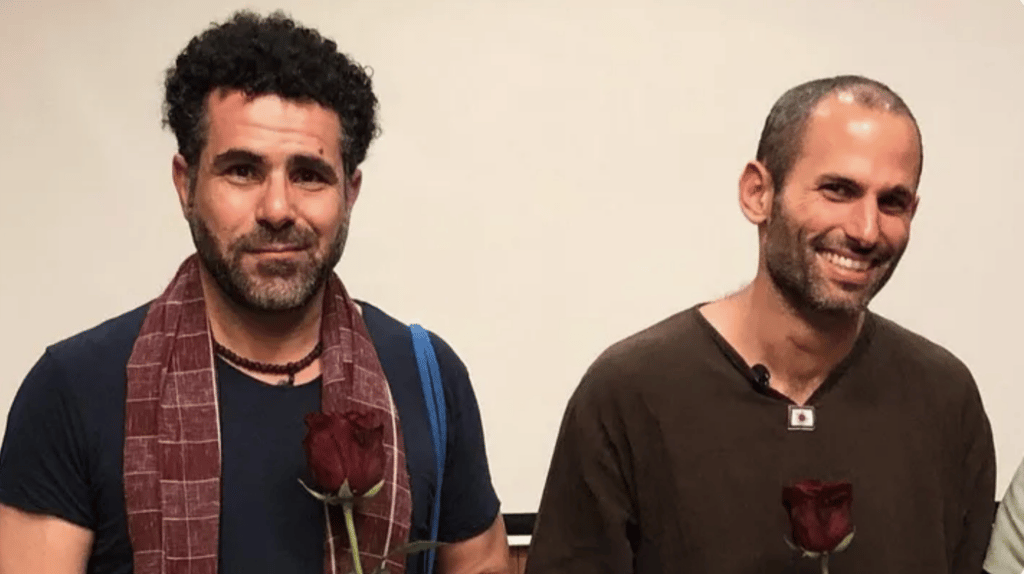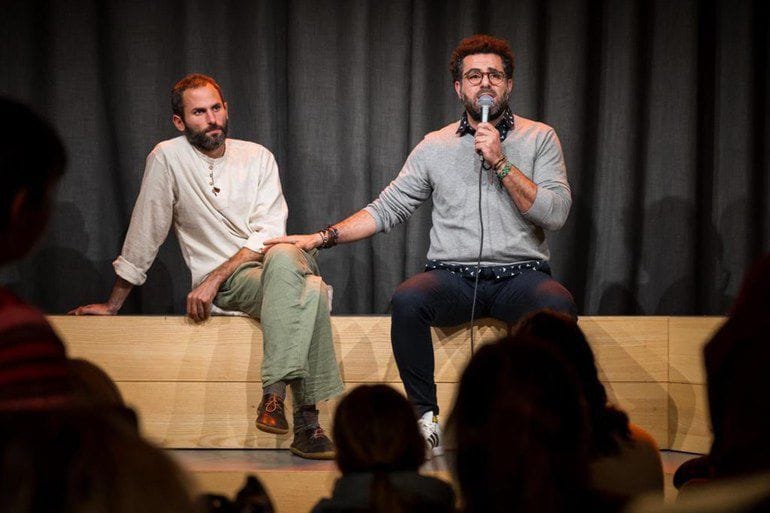Firstly, I’d like to acknowledge how hard it is for many people to talk about what’s happening in Israel and Palestine. The October 7th, 2023 Hamas attack on Israel was the most murders of Jews in a single day since the Holocaust. And the Israeli government’s response has been so horrific that it’s being called a genocide by many people around the world. The reality that the Palestinian people are facing is one of famine, disease, and bombs from above. Heartbreaking and inhumane aren’t big enough words.
One thing most of us agree on is that hope for peace feels hard to grasp. There are people and organizations globally that are working towards that hope of peace. One particularly mighty duo believes that the path to peace is to shine a light on what’s happening on the ground; creating safe spaces where people can come together, share stories, and work as one toward collective freedom.

Meet Palestinian and Israeli peace activists, Osama Iliwat and Rotem Levin
Osama and Rotem have been touring the globe sharing their story about Palestinian and Israeli peace activism. They call these talks “CommUNITY Gatherings” and they give their unique perspective on a possibility of a shared future of security, equality, and justice for all people.
The following quotes come from our email correspondence. They are not attributed to any one person since they answered the questions collectively.
How Osama and Rotem Share How They Met:
“We met 8 years ago in Israel/Palestine when we were starting to give talks to pre-military groups through an organization called Combatants for Peace. In October 16, 2023, we had a two week advocacy tour planned to Germany, but because of the October 7 attack, the Israel airport was closed and we had to travel together through Jordan. This was maybe the first time we felt equal in relation to freedom of movement. Then we found out that there is a big need in Germany for this alternative narrative, so the momentum built and we gave talks for five months around Germany – in universities, high schools, community centers, etc. We realized we wanted to come do similar work in the U.S. because our military system is so intertwined with the American system. We are trying to create a shift in public opinion about the war, what peace can look like, and how we can fight for each other and change the system so we can have freedom, safety, and equality for all Palestinians and Israelis between the river and the sea. We believe that this the only way to guarantee the safety of everyone.”
Watch one of their talks here:
Key Insights on the Palestine-Israel Conflict
I’ve been trying to listen and take in the complexity of the Palestinian and Israeli conflict from all sides. I come at it objectively best I can and try to pull my emotions out of it so I can share just facts when possible. Osama and Rotem’s perspectives are interesting to me because they want to share the complexity of the situation while also inspiring others to think beyond what’s happening now and in the media.

What Osama and Rotem wish people knew or understood about the issues happening between Palestine and Israel right now:
“It’s important to remember the history and how this conflict began. It’s not a conflict between Jews and Muslims. It’s a conflict that started with zionism, and the ethnic cleansing of Palestine in 1948. We also acknowledge that the persecution of Jews in Europe throughout history – which manifested in the Holocaust – was something that gave international legitimacy to the zionist movement. We believe that it’s time to transform zionism to an inclusive system where everyone is free, and this is the way to guarantee safety. As long as zionism is exclusive only to jews, the people who are oppressed will continue fighting the system.
People need to understand that there is an occupier and there’s people living under Occupation for more than half a century, and Israel can’t continue upholding apartheid rules on a people and expect them to be loving. The only way to create safety is to give people rights – then they’ll have something to lose and defend.
We want to talk about history in order to understand the practices that are still being used to this day, but we’re looking for ways to create a better future for all of us. We manage to forgive one another, and become friends and partners because this is the only way to create a better way. “

What You Can take Away From Their Community Gatherings and Talks About Peace
What I personally took away from a talk between Osama and Rotem is their respect for each other’s experience and the glimmers of hope they have for the world to eventually heal. It’s a hard thing to imagine… peace. Is it possible? To Osama an Rotem, it is. But also we must open our eyes to the full story, from all sides with compassion.
On What We Can Learn from Their Talks:
“Peace is possible and we can live together as Israelis and Palestinians, but we have to change the system. We have to find ways to create a real democracy, which is the way to guarantee everyone’s safety, because no one will be safe as long as others are not free, and visa versa. We need your help as Americans to change the system and put pressure. For example, stop sending weapons and supporting one side unconditionally. Force both sides to commit to international law.
What people can take from our talk is to open their eyes to the reality and the truth. To fight for everyone – choosing the side of humanity and not nationality. Understand that there’s good and bad on both sides, there’s no one entire good and bad side. Our conflict is bigger than Israelis and Palestinians. It’s more global. The right fight is to figure out how to fight for each other’s safety – not celebrating the pain of one another.”

What Can We Do?
The idea of what we can do from here feels like a heavy question to ask ourselves when the issue sometimes feels too large to fix. So, in my interview with Osama and Rotem, I wanted to ask them what they felt we could do.
How Osama and Rotem say others can foster peace in their own community:
“Educate themselves about what’s going on, getting out of victimhood zones, and open their eyes. Create safe spaces where people from different backgrounds can come and share their perspectives, and be listened to. We need restorative spaces where people come with the intention to listen, not win a conversation.”
Where to Find Osama and Rotem Online?
Although the events have moved on from The Bay, the team is continuing to tour and share their story around the world.Go to one of their talks OR watch one online: https://linktr.ee/saltoftheearthorgFollow their adventured on their Instagram: https://www.instagram.com/saltoftheearthorg
In these challenging times, it can feel overwhelming to grasp how to contribute to peace. But Osama and Rotem offer a path forward using the act of listening with compassion at the center of the conversation. By breaking down barriers and working together, they show us that peace is possible in the world if we work together, educate ourselves and consider what collective freedom looks like for everybody.
The post These Palestinian and Israeli Activists are Teaming Up for Collective Freedom appeared first on Broke-Ass Stuart's Website.








